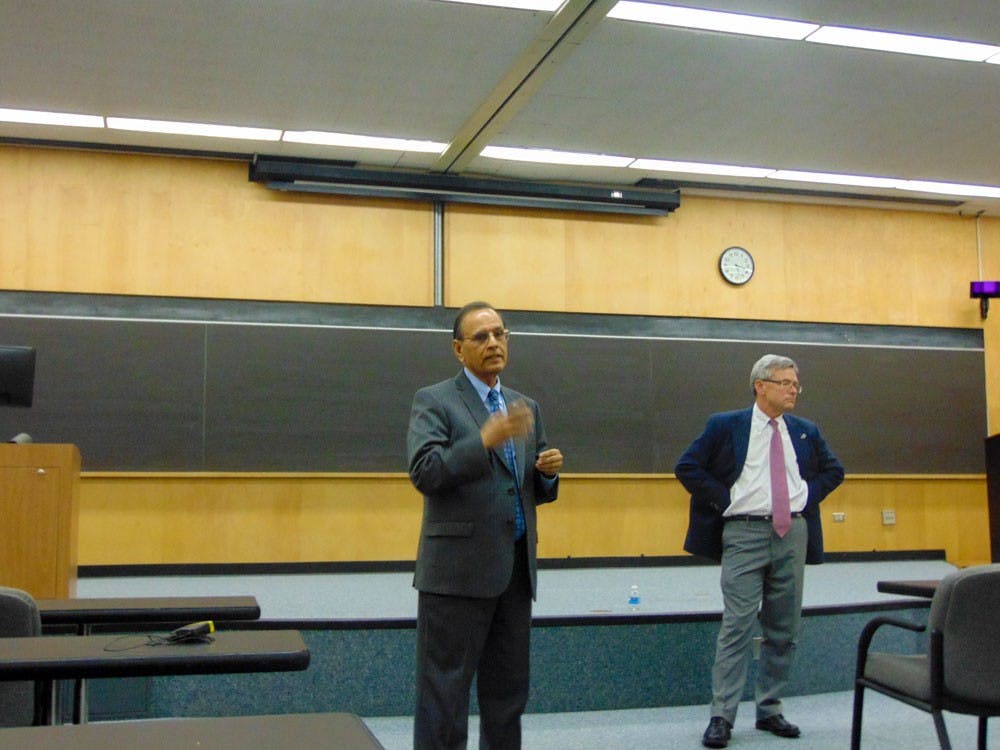UB faculty members in the Natural Sciences department have a number of concerns, including campus cleanliness, base stipends, expanding the Communities of Excellence and freshmen seminar funding.
Faculty members from the Natural Sciences department gathered in 120 Clemens Hall to voice their concerns to UB President Satish Tripathi and Provost Charles Zukoski at the third town hall meeting of the semester.
Tripathi began the town hall meeting saying it would be more dialogue-based.
College of Arts & Sciences Dean Robin G. Schulze attended the meeting and didn’t speak but spoke with The Spectrum afterward.
Schulze said the problems that have been discussed in all three town hall meetings are all very common in higher education and are nation-wide issues.
“We are not the only school facing a resource-poor environment with declining public support. This is happening every place, so every issue I’ve heard in every town hall meeting about how we’re expanding resources, and how we’re going to get more resources and how we’re going to live with fewer resources, really having worked at a variety of really great higher-ed institutions,” Schulze said. “These are the problems everywhere.”
Schulze will be holding similar public meetings with the CAS faculty hopefully this semester. She said these town hall meetings have served as a model for how she wants to hold her own meetings. She said CAS is trying to do “a rapid strategic planning process” of the college where they come together to talk about their priorities.
“The more we talk to people in times of change and stress, the better off we are,” Schulze said.
After a half a semester at UB, Schulze is impressed with the quality of research, the strong faculty body and creativity to solve problems at UB.
“Every question people have is how to make this place better and that’s important,” Schulze said.
Topics discussed in the meeting is as follows:
Overall campus cleanliness
One faculty member voiced his concerns about campus cleanliness. He said cleanliness was especially a problem during Open House this past weekend.
“Four, five years ago there was a person in facilities who was charged in special events for just overseeing, making sure the campus was actually clean,” he said. “Our building was a disaster. I’ve called and called and called and it’s just not taken care of.”
He said when parents visit a college campus and see that it is not clean, it is “completely off-putting.”
“The peeling floors and elevators and badly painted surfaces, these are not good things,” he said.
Tripathi responded saying he would inform the facility department about these issues. He said the university has received complaints about campus cleanliness in the past.
Increase in base stipend for TAs
There has not been an increase in the base stipend for teaching assistants for an “extraordinarily long time,” the same faculty member in biological sciences said.
He said the biological sciences department has reached a critical phase and can no longer compete with graduate students “within their own universities.”
“When it comes to the fixed budget that we’re in, we need to potentially think different about how are we going to sustain the research program that we have and how we’re going to sustain our educational programs and how we’re going to do that in the physical climate we’re in--where it harder and harder to get grants, the costs are going up and the revenue of the university is flat,” Zukoski said. “There aren’t pots of gold hidden in your office or mine and so it’s a matter of how we think and act differently about delivering education…”
Freshmen seminars
When Zukoski asks students about the freshmen seminars, he gets “remarkably upbeat and pleased commentary” from them.
However, one faculty member said the seminars have placed additional teaching loads on faculties and departments and some smaller departments are feeling the extra load. She said they were promised resources to help free up senior faculty to teach them, but she hasn’t seen any of these resources yet.
Zukoski said the resources were allocated and transferred into the college’s budget. As the student number grows, the dollar credit hour growth “kicks in.”
Zukoski transfers the money into the college’s budget and afterward speaks with Schulze about the budget she inherited that “she’s now trying to understand and work her way through.”
Zukoski and the faculty member said the university is in a “time lag” right now.
“One of time lags is that Robin [Schulze] is simply coming in and understanding a world that she inherited and trying to figure out how to rationalize the budget in a way so that these big changes can be reflected in the budgets the departments are getting and that’s the best I can say,” Zukoski said.
A faculty member in the Geology department is concerned that until this happens she will be teaching additional classes on top of her regular teaching load. She said this affecting her research program, graduate course and especially the Masters students.
Zukoski said he and Schulze are “working hard” on this and don’t have immediate solutions.
Communities of Excellence
A faculty member asked Tripathi and Zukoski if the university had plans to expand the Communities of Excellence.
The Communities of Excellence is part of the UB 2020 Signature Initiative to address the problems and “questions of our time” through education, engagement and research, according to UB’s website. There are three areas of the Communities of Excellence including Global Health Equity, the Genome the Environment and the Microbiome and Sustainable Manufacturing and Advanced Robotic Technologies (SMART).
“In many ways [The Communities of Excellence] now seems to be the only way that faculty can get together and actually grow particularly within the College of Arts & Sciences,” he said.
Hannah Stein and Ashley Inkumsah are the c-senior news editors and can be reached at news@ubspectrum.com





